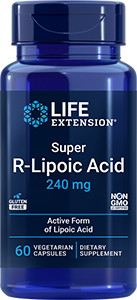
Newsletter
Newsletter
Can vitamin C help protect against “the big C”?

Having higher vitamin C intake was related to a lower risk of numerous cancers in a comprehensive umbrella review published on January 20, 2022 in Frontiers in Nutrition.1
The review evaluated 57 meta-analyses of cancer-related outcomes related to vitamin C intake. Compared to those with the lowest intake, study participants whose vitamin C intake was highest had a:
- 42% lower risk of cervical cancer
- 22% lower risk of kidney cell carcinoma
- 16% lower risk of bladder cancer
- 15% lower risk of endometrial cancer
- 11% lower risk of breast cancer
- 11% lower risk of prostate cancer
High vitamin C intake was also associated with a 19% lower risk of breast cancer recurrence, a 22% lower risk of dying from breast cancer and an 18% reduction in the risk of mortality from all causes among breast cancer patients.
When digestive system cancers were evaluated, the highest intake of vitamin C was associated with a 42% decrease in the risk of esophageal cancer, a 34% lower risk of stomach cancer and a 30% lower risk of pancreatic cancer compared to the lowest intake.
The risk of glioma, a type of brain and spinal cord cancer, was 14% lower among individuals whose vitamin C intake was highest. Lung cancer risk was 17% lower and total cancers were 13% lower when highest vs. lowest vitamin C intake groups were compared. In the meta-analysis of total cancers, each 100 mg per day increment of vitamin C intake was associated with a 7% decreased cancer risk.
“[Linus] Pauling et al. proposed that many patients with malignant neoplasms need vitamin C …in 1979,” authors Zeyu Chen and colleagues at Sichuan University wrote.
“Increased intake of ascorbic acid could bring measurable benefits in prevention and treatment of cancer,” they observed. “We concluded that vitamin C was related to lower risk of multiple cancers of diverse systems.”
Products
Apply What You've Learned: Vitamin C
- Antioxidants like vitamin C may help prevent many diseases, including certain cancers, in which oxidative stress is a contributing factor.2,3
- Vitamin C may not only play a role in cancer prevention—it also has been used as a cancer therapy when administered in high intravenous doses.4
- Humans are among the few animals who don’t produce their own vitamin C. Therefore, it is critical that we get enough of this essential nutrient from food and/or non-food sources. Concerningly, a U.S. nationwide health survey found that vitamin C insufficiency exists in more than 40% of the population.5
- The RDA of vitamin C for adults 19 years of age and older is currently 90 mg per day for men and 75 mg per day for women.6 Research conducted by notable scientists such as two-time Nobel Prize Winner Linus Pauling suggests there may be benefits with much higher daily vitamin C intake.7,8
References
- Chen Z et al. Front Nutr. 2022 Jan 20;8:812394.
- Klaunig JE et al. Curr Pharm Des. 2018;24(40):4771-4778.
- García-Sánchez A et al. Oxid Med Cell Longev. 2020 Jul 23;2020:2082145.
- Böttger F et al. J Exp Clin Cancer Res. 2021 Oct 30;40(1):343.
- Crook J et al. Nutrients. 2021 Oct 30;13(11):3910.
- “Vitamin C.” National Institutes of Health Office of Dietary Supplements. 22 Mar 2021. https://ods.od.nih.gov/factsheets/VitaminC-Consumer/
- Higdon J et al. “Vitamin C.” Data on file.
- Carr AC et al. Crit Rev Food Sci Nutr. 2021;61(5):742-755.
Featured Life Extension Magazine® Article
The Prospect of Human Age Reversal, by William Faloon
Life Extension has been publishing groundbreaking findings in anti-aging research for more than four decades. Important new discoveries in the field of aging were announced by Life Extension cofounder William Faloon at the 2021 Revolution Against Aging and Death conference (RAADfest).
Findings were presented from studies that examined injecting plasma from young rats into aged rats, hyperbaric oxygen’s benefits to human telomeres and other methods of reducing the rate of telomere shortening, a new drug tested in a mouse model of Alzheimer’s disease that restored cognitive function, lifespan extension via CRISPR gene editing in mice, and other anti-aging therapies on the horizon or available now.
What's Hot
Health Concern
Vitamin C plus fasting-mimicking diet fights cancer in experimental research
Research involving colorectal cancer cells and mice with colorectal cancer reported on May 11, 2020 in Nature Communications revealed a benefit for combining vitamin C with a diet that elicits the effects of fasting.

Cancer Adjuvant Therapy
Review integrative and novel therapies, including natural interventions and the off-label use of common drugs, which have potential value in the setting of adjuvant cancer care.
Related Life Extension Magazine® Articles

A Longer-Lasting Vitamin C
A new liposomal hydrogel formula increased vitamin C blood levels nearly seven times greater than regular vitamin C and kept them higher far longer.

The Link Between Vitamin C And Optimal Immunity
Most animals internally synthesize high amounts of vitamin C. Humans lack this ability and are entirely dependent on dietary or supplement ascorbate sources to remain alive. In addition to its vital role in maintaining the body’s collagen structure, vitamin C augments numerous components of the immune system.
Life Extension Media
Life Extension’s Media page features a variety of videos, audio recordings and podcasts to keep you informed concerning the latest findings in nutrition, health and living longer. Discover what’s new from Life Extension – from spotlights on our newest formulations to our latest sales and more!
Subscribe to Life Extension’s YouTube channel to view the newest videos offered by Life Extension.
Learn MoreLife Extension Magazine® Issue Now Online
A remarkable number of healthy-longevity findings have been published over the past 18 months.




